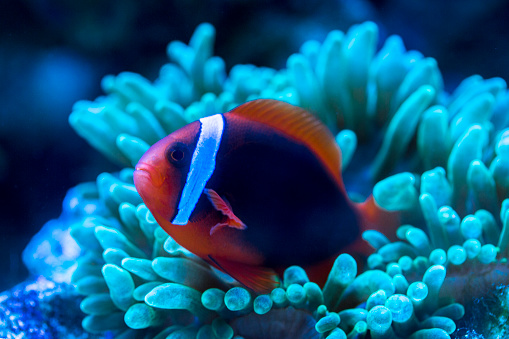ANIMAL: Tomato Clownfish Amphiprion frenatus Type of Animal: Clownfish Habitat: Lagoon reefs & tropical reefs, host in anemones as well as in corals Location(s): W & Indo-Pacific from S Japan to Indonesia, N Australia, & SW Palau Appearance: Bright orange-red fish w/ white head bar/vertical stripe behind eyes, joined over head w/ distinctive black outline, females have more blackish while males have more red, juveniles darker red w/ 2-3 white bars, females larger than males Food/Diet: Algae, small shrimp, rotifers, planktonic copepods, planktonic fish eggs, crustacean larvae, zooplankton Status in Wild: Stable Conservation: Breeding in aquariums, aquaculture, & zoos Lifestyle: All clownfish born as males w/ most dominant clownfish becoming female. Colony ranges from 1 monogamous pair to monogamous pair w/ juveniles/subordinate males. When female dies, her mate becomes female & next male in hierarchy or new male becomes breeding partner. Juveniles sometimes found alone. Dominance determined by size. Additional Info: Called: Male Female Young: Fry Group: Colony Weight: Male: 3.2-4 oz Female: 6.4-8 oz Gestation: 6-11 days Life Span: 4-10 years Body Length: Male: 2 in Female: 4 in Main predators are larger fish, sharks, & eels. Also called Tomato Anemonefish, Blackback Anemonefish, Bridled Anemonefish, Fire Clown, Red Tomato Clown, Onebar Anemonefish, & Red Clown. Often abbreviated as TC in aquarium trade. Like other clownfish/anemonefish, well-known for mutualistic relationships w/ anemones. Sea anemone protects clownfish from predators as well as providing food through scraps left from anemone’s meal & dead anemone tentacles. In return, clownfish defend anemone fiercely from predators/intruding clownfish. Unlike many clownfish, they can thrive w/o host anemone & utilize coral host if anemone not available. Sometimes mistaken for Australian Clownfish, Cinnamon Clownfish/Red-and-Black Anemonefish, & Red Saddleback Anemonefish. Pairs/colonies extremely territorial, often fighting to the death w/ intruders. Females will especially fight to the death. Maturity determined more by size than age. Spawning occurs during full moon. After hatching, fry drift for around 16 days in plankton-rich waters. Clownfish only take anemones not filled by other clownfish. Females release anything from 100-1,000 eggs. Sometimes hybridize w/ Cinnamon & Fire Clownfish. Fun Fact(s): These highly territorial fish will even attack divers who come too close to their patch. Females & dominant males produce chirps & pops while charging/chasing subordinates. They’re fairly popular home aquarium fish.
